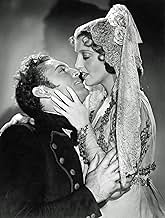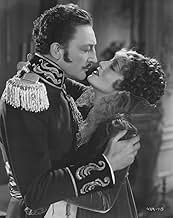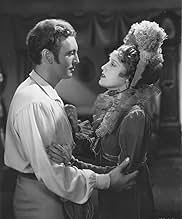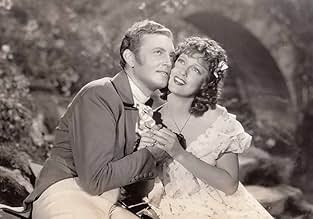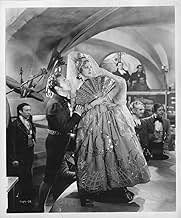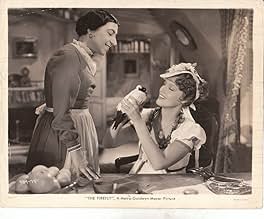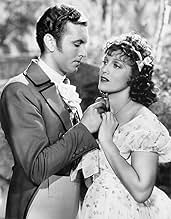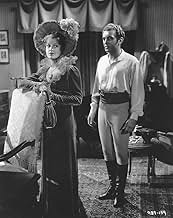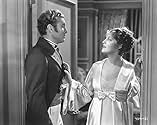Durante las guerras napoleónicas, las aventuras y amores de una espía y cantante de cabaret española.Durante las guerras napoleónicas, las aventuras y amores de una espía y cantante de cabaret española.Durante las guerras napoleónicas, las aventuras y amores de una espía y cantante de cabaret española.
- Dirección
- Guionistas
- Elenco
- Premios
- 3 premios ganados en total
Douglass Dumbrille
- Marquis de Melito
- (as Douglas Dumbrille)
Tom Rutherford
- King Ferdinard
- (as Tom Rutherfurd)
Corbet Morris
- Duval
- (as Corbett Morris)
Victor Adams
- Jail Guard
- (sin créditos)
Monya Andre
- Civilian Wife
- (sin créditos)
Sam Appel
- Fruit Vendor
- (sin créditos)
Pilar Arcos
- Gypsy
- (sin créditos)
Hooper Atchley
- French Soldier Requesting Flowers
- (sin créditos)
Opiniones destacadas
Allan Jones has a wonderful voice, but a rather bland personality. He is no match for Jeannette MacDonald, who here gives her best dramatic performance on screen with not much to play against. Warren William is the villain and he has more presence than Jones.
Jones and MacDonald play spies, he for France and she for Spain, during Napoleon's attempt to kidnap the King of Spain and add that country to his fiefdom. There is much intrigue and a few songs along the way, the best known being The Donkey Serenade and Gianina Mia.
The problem lies in the length of the scenes and musical numbers. This film could easily have had half an hour snipped out of it, bringing it closer to conventional playing times of the period. At 2 hours, 10 minutes, it is just too long. And it is heavy-handedly directed and written.
The original operetta from 1912 had a few good tunes. Friml was third in line of talent, behind Romberg and Herbert, as America's trio of operetta composers. The score is just not good enough to mount a major film around.
MacDonald is always worth seeing, as she either matches or outshines her best material. This one, like Broadway Serenade a few years later, was not one of her best films and is recommended for her fans and those of Jones only.
Jones and MacDonald play spies, he for France and she for Spain, during Napoleon's attempt to kidnap the King of Spain and add that country to his fiefdom. There is much intrigue and a few songs along the way, the best known being The Donkey Serenade and Gianina Mia.
The problem lies in the length of the scenes and musical numbers. This film could easily have had half an hour snipped out of it, bringing it closer to conventional playing times of the period. At 2 hours, 10 minutes, it is just too long. And it is heavy-handedly directed and written.
The original operetta from 1912 had a few good tunes. Friml was third in line of talent, behind Romberg and Herbert, as America's trio of operetta composers. The score is just not good enough to mount a major film around.
MacDonald is always worth seeing, as she either matches or outshines her best material. This one, like Broadway Serenade a few years later, was not one of her best films and is recommended for her fans and those of Jones only.
Jeannette MacDonald and Allan Jones star with Warren William in "The Firefly," a 1937 MGM film.
MacDonald plays Nina Maria Azara, a singer, who is also a spy for Spain during the Napoleonic Wars. She is to seduce French officers and find out Napoleon's plans for Spain.
She meets Don Diego, who pursues her while she is working as a singer. She has to stave him off in order to meet with those who can give her information, among them Major de Rouchemont (William).
Don Diego keeps showing up, including on her trip to Bayonne. There, the famous Donkey Serenade is introduced. Unknown to her, Don Diego is actually Captain Andre, who is sent to Spain to spy on her.
The story is a backdrop for all of the music, and there is a ton of it. MacDonald's voice was highly touted; with today's ears, it was a lovely voice, particularly in the middle, but I was never crazy about her top notes. I think it was just the way women were trained by then. She was a beautiful woman and a fine, fiery actress, and her popularity was well deserved. She does a good job here.
Allan Jones was not the most sparkling presence -- he certainly was no match for MacDonald in that department -- but he truly had a beautiful voice. Warren William was very good in a villainous role.
Most of the music was written by Rudolf Friml and Herbert Stothart, so you need to like operetta in order to like this film, and also classical voices.
MacDonald plays Nina Maria Azara, a singer, who is also a spy for Spain during the Napoleonic Wars. She is to seduce French officers and find out Napoleon's plans for Spain.
She meets Don Diego, who pursues her while she is working as a singer. She has to stave him off in order to meet with those who can give her information, among them Major de Rouchemont (William).
Don Diego keeps showing up, including on her trip to Bayonne. There, the famous Donkey Serenade is introduced. Unknown to her, Don Diego is actually Captain Andre, who is sent to Spain to spy on her.
The story is a backdrop for all of the music, and there is a ton of it. MacDonald's voice was highly touted; with today's ears, it was a lovely voice, particularly in the middle, but I was never crazy about her top notes. I think it was just the way women were trained by then. She was a beautiful woman and a fine, fiery actress, and her popularity was well deserved. She does a good job here.
Allan Jones was not the most sparkling presence -- he certainly was no match for MacDonald in that department -- but he truly had a beautiful voice. Warren William was very good in a villainous role.
Most of the music was written by Rudolf Friml and Herbert Stothart, so you need to like operetta in order to like this film, and also classical voices.
10guidon7
Wonderful mix of music, romance and comedy but I concede a trifle too long, the length however acceptable with these two. Jeanette MacDonald could do everything; sing beautifully, act as well and surprisingly (I just watched this one after many years) a gifted dancer. MacDonald and Jones are quite compatible and I can see where, had fate taken a hand, it could have been these two and not Nelson Eddy, not to downgrade Nelson's resonant baritone in any way. Allan Jones was a better actor, and was one of the finest tenors in movie history. There was one brief comic bit I found hilarious -- it was so short it may have been overlooked by many. Don Diego (Allan Jones) is singing the famous Donkey Serenade to MacDonald as she rides along in a coach. He sings the line "But try as she may, in her voice there's a flaw", to this jibe at her voice, Jeanette's displeasure shows in a grimace! The expert supporting cast is up to MGM'S standards; Warren William, Billy Gilbert, George Zucco, Douglas Dumbrille, Henry Daniell and even a one-line appearance by Ralph Byrd (a.k.a. Dick Tracy in the 1940's). I highly recommend this film, especially to fans of light operetta. The music is delightful and Jeanette and Allan give it their all. Jones' last appearance was a 1980 role on the Love Boat TV program. Upon retirement from the screen (big screen and little) he became a dentist, quite a surprise. I wonder if he sang for his patients? If he did I'm sure his waiting list was the envy of his fellow dentists.
Spy-thrilla where Jeannette MacDonald must get napoleonic soldiers to reveal their secrets. Warren Williams (The Lone Wolf!) is the Major; Billy Gilbert who sneezed his way through films is the innkeeper. Douglass Dumbrille always played the bad guy, and here is the Marquis. Dance numbers, singing. It's Jeanette MacDonald, who always does operatic arias. Yawn. Pretty dated stuff. Intrigue. suspense. love triangles. It's a pretty dry period piece, which is never my first choice. Kind of a mata hari. Showing on Turner Classics. It's pretty well done, but moves pretty slowly. the songs keep bringing it to a screeching halt. I'd skip this one unless you're a fan of J. MacDonald. Directed by Robert Leonard... nominated twice, but never got the Oscar.
France and England are at war. Napoleon has placed troops in Spain "to protect the Spanish" in case England invades.
There is a beautiful cantina singer (and dancer!) named Nina Maria (Jeanette MacDonald) whom men fight over. She works as a spy for Spain. When Napoleon invites Ferdinand--who appears guileless--to France for a meeting, Nina Maria must leave for France immediately to determine if Napoleon's intentions are honorable.
She is pursued there by Don Diego (Allan Jones), a man smitten by the senorita. Along the way, he tries to charm her by singing "The Donkey Serenade"--one of the most memorable moments in the film.
When they arrive in Bayonne, France, things get complicated. The senorita discovers someone is on to her. The love story becomes more political as Nina Maria must make alliances based on trust. Will she let her heart guide her actions? What is Napoleon's true objective?
The two leads are excellent. Much of the surrounding cast portray military characters and they are very strong.
The lavish sets and a large number of extras give the film a feeling of richness, as when Joseph Napoleon and his military escort ride into Madrid.
Part romance, part political intrigue, "The Firefly" entertains while Jeanette MacDonald shines.
There is a beautiful cantina singer (and dancer!) named Nina Maria (Jeanette MacDonald) whom men fight over. She works as a spy for Spain. When Napoleon invites Ferdinand--who appears guileless--to France for a meeting, Nina Maria must leave for France immediately to determine if Napoleon's intentions are honorable.
She is pursued there by Don Diego (Allan Jones), a man smitten by the senorita. Along the way, he tries to charm her by singing "The Donkey Serenade"--one of the most memorable moments in the film.
When they arrive in Bayonne, France, things get complicated. The senorita discovers someone is on to her. The love story becomes more political as Nina Maria must make alliances based on trust. Will she let her heart guide her actions? What is Napoleon's true objective?
The two leads are excellent. Much of the surrounding cast portray military characters and they are very strong.
The lavish sets and a large number of extras give the film a feeling of richness, as when Joseph Napoleon and his military escort ride into Madrid.
Part romance, part political intrigue, "The Firefly" entertains while Jeanette MacDonald shines.
¿Sabías que…?
- TriviaThe song "The Donkey Serenade" was not in the original stage production. It was written for the film, but the music was adapted from the song "Chansonette," from the stage version of "The Firefly."
- ErroresWhen by the bridge we see a female with very long black plaits walking with her beau across the bridge. Not long after we see a closer shot of them about to walk across the bridge.
- Citas
Don Diego: You have one bad habit.
Nina Maria Azara: Oh, yes? What?
Don Diego: You're always saying good-bye.
Nina Maria Azara: Very well then, I won't say good-bye. I'll just go!
- Créditos curiososEach time the dancing girls dance across the screen, a new screen credit is revealed.
- ConexionesFeatured in MGM Parade: Episode #1.25 (1955)
- Bandas sonorasLove Is Like a Firefly
(uncredited)
Music by Rudolf Friml
Lyrics by Bob Wright and Chet Forrest
Sung by Jeanette MacDonald
Selecciones populares
Inicia sesión para calificar y agrega a la lista de videos para obtener recomendaciones personalizadas
Detalles
- Fecha de lanzamiento
- País de origen
- Idiomas
- También se conoce como
- Tarantela
- Locaciones de filmación
- Alabama Hills, Lone Pine, California, Estados Unidos(Donkey Serenade sung)
- Productora
- Ver más créditos de la compañía en IMDbPro
- Tiempo de ejecución
- 2h 11min(131 min)
- Relación de aspecto
- 1.37 : 1
Contribuir a esta página
Sugiere una edición o agrega el contenido que falta


